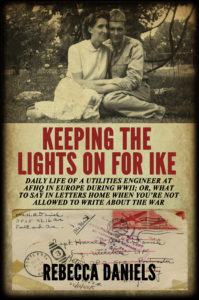
Publisher: Sunbury Press, February 2019
Category: Memoir, History, Military, WWII, and Biography
Tour Dates June and July, 2020
ISBN: 978-1620061145
Available in Print and ebook, 284 pages
Description Keeping the Lights On for Ike by Rebecca Daniels
Daily Life of a Utilities Engineer at AFHQ in Europe During WWII; or, What to Say in Letters Home When You’re Not Allowed to Write about the War
Most people don’t realize that during the war in Europe in the 1940s, it took an average of six support soldiers to make the work of four combat soldiers possible. Most of what’s available in the literature tends toward combat narratives, and yet the support soldiers had complex and unique experiences as well. This book is based on personal correspondence, and it is primarily a memoir that creates a picture of the day-to-day realities of an individual soldier told in his own words [as much as he could tell under the wartime rules of censorship, that is] as well as giving insight into what it was actually like to be an American soldier during WWII.
It explores the experiences of a non-combat Army utilities engineer working in a combat zone during the war in Europe and takes the protagonist from basic training through various overseas assignments—in this case to England, North Africa, and Italy as a support soldier under Eisenhower and his successors at Allied Force Headquarters. It also includes some reflections about his life after returning to Oregon when the war was over.
The soldier involved is Captain Harold Alec Daniels [OSU, Class of 1939, ROTC] and most of the letters were written to his wife, Mary Daniels [attended U of O in the late 1930s]. They are the author’s parents, and she inherited the letter collection, photos, and all other primary source materials after her mother’s death in 2006.
Praise Keeping the Lights On for Ike by Rebecca Daniels
“The book moves swiftly along, while at the same time capturing the frustration of their prolonged separation. The historical timeline provides just the right bit of historical context to these war years behind at the tail of the army. This is not the typical WWII combat book.”- The Montague Reporter
“The lack of military detail — the focus on everyday life and on the relationship between Alec and Mary — ends up being one of the book’s greatest assets. Many works of history detail the story of great battles. Fewer dwell on individual wartime experiences. The book is also strengthened by the affection expressed in Alec’s relatively inarticulate yet moving letters to his wife on the home front.”- Tinky Weisblat, Greenfield Recorder, author of “The Pudding Hollow Cookbook,” “Pulling Taffy,” and “Love, Laughter, and Rhubarb”
“Carefully researched history and a beautiful remembrance of one soldier’s letters home. A poignant and personal look into the lives of two very private people and an extraordinary first hand example of why it’s called the Greatest Generation. In detail and in truly first class research one is left with the sense that they know these two people very well. Not only is this a well written historical account of World War II, it is a touching and gentle love story from a remarkable author with a most deft touch and turn. Got five stars from me. So worth it.”-W. Richards, Amazon
“This book made me feel almost like I was right there with Alec and Mary as they experienced that time of their lives. My parents, being the same age, also had a similar experience and I thought of them as I read every word. The author cleverly brought to life their story and for that I shall be forever grateful.”- Sunbury Press Reader Review
Excerpt Keeping the Lights On for Ike by Rebecca Daniels
An officer, possibly Lt. Col. W.E. Northrop (one of Alec’s “bosses”), with two members of the 149th Post Headquarters Company of WAACs in Algiers.
Excerpt from Chapter 7: Settling Into Algiers (January—April 1943)
At this point in January, it’s clear he had received more letters from her and that she had been complaining about a gender double standard, possibly in relation to the fact that women were not permitted to serve in the military at that time, so she was forbidden to join up to be near him:
What you say about the double standard is quite true. In fact, too true. It is a shame the people have to consider that women must be different from men. It must be an inheritance we have from the Arabs. For even the Arab women think women are nothing and are disgusted when they have girl children. The Arab women have no rights at all, are purchased as wives and told to scram when the man wants a divorce. The Arabs also have more than one wife if they can afford it. That has its good points and its bad ones. At times, why more than one wife might be enjoyable, as I do like women, but if I had more than one wife there would be something lacking between me and my wives. You see, just by my being your hub alone and you being my wif (his pet name for her) alone there is a close relationship that exists between us and I wouldn’t want to change it for all the queens in the world, and there are some beauties here as I have seen when going through the town. There seem to be more beautiful women here than there were in England. I don’t imagine I will be meeting any, though, as I have very little spare time in the day and every place closes after 7:30 at night. Then, too, there is the difference between the languages. (January 8, 1943)
Early in the war, many men, including members of Congress, the press, and the military establishment, had joked about the notion of women serving in the military, but as America increasingly recognized the demands of conducting a war on two fronts—Japan and Germany—leaders also faced an acute manpower shortage. So, in May 1942, the House and the Senate approved a bill creating the Women’s Army Auxiliary Corps (WAAC). At first, though the women who joined considered themselves in the Army, technically they were civilians working with the Army. By spring of 1943, however, 60,000 women had volunteered, and finally, in July 1943, a new congressional bill transformed the WAAC into the Women’s Army Corps (WAC), giving the women true military status.[i] In late January, Alec wrote:
The WAACs have taken over here now and things are in a hubbub to get them fixed up. They seem to be a very conscientious bunch and very much enthusiastic about the work, and also a little acclimated to Army life. I understand some of them can and do swear as bad as any of the soldiers, but that’s only the minority. As for any getting jealous, it’s not necessary as they are by far a homely bunch and I never have enough spare time to do any chasing, which I don’t care about doing anyway. All I want to do with my spare time is sleep and possibly go to a movie. (January 31, 1943)
In a special history of the Women’s Army Corps, published by the Army’s Center of Military History, the group of women Alec described in January of 1943, was identified as a unique unit:
The 149th WAAC Post Headquarters Company, called by newspapers “the first American women’s expeditionary force in history,” was one of the most highly qualified WAAC groups ever to reach the field. Hand-picked and all-volunteer, almost all members were linguists as well as qualified specialists, and almost all eligible for officer candidate school. The company was shipped from the United States on a regular military transport, which encountered no enemy action. …
The unit reported on 27 January 1943 to General Eisenhower’s headquarters in Algiers, a location now considered safe, except for air attack, from the conflict still raging to the east. …Working hours were long; women were carried in trucks to the headquarters at an early hour, and home again for an early curfew. The nightly bombings, with brilliant displays of antiaircraft fire, made sleep difficult for the first weeks.
Nevertheless, most women managed a satisfactory adjustment. … Morale was high, and women called themselves the luckiest in the Corps. …
The largest part of the company went to the Signal Corps and to the newly organized Central Postal Directory. Others were assigned, by twos and threes, to various headquarters offices: three to the Office of Psychological Warfare; three to the adjutant general’s office; one as General Eisenhower’s secretary and one as his driver; more than a half dozen to drive other officers. Ten more were assigned as cooks and bakers to keep food ready for workers on three shifts.[ii]
Alec having lunch with two of the WAACs at AFHQ.
Based on Alec’s reaction to things Mary said in her letters, it seemed that she might have been thinking of becoming a WAAC in hopes of being closer to him. He tried to dissuade her, but not because he disapproved of women in the military:
You have hinted so much about the WAACs that I must say it would probably be interesting to you if you could get to travel, but you would never get to see me, as that is forbidden. So make up your own mind, as I am quite a ways away to do it for you. Many of the soldiers don’t seem to like the fact that the WACs are over here. What I think is it is jealousness in finding that women can get into a war as well as men. I think lots of the soldiers feel that they are protecting their women and so want them to stay where they are safe. Personally I think it is a good idea to have them here, as they are just suited to some of the work that must be done. Anyway I think a woman’s place is where she wants to be, not where someone puts her because of her sex. (undated, probably mid-March 1943)
This was an unusual point of view for a man of his time. In fact, a reporter in Washington, DC, printed the protest of a soldier to his girl, who wanted to join the Women’s Army Corps: “‘I won’t have a girl of mine called a WAC.’ When the girl defended the [idea] the soldier said firmly: ‘All right, you can be a WAC, but you won’t be mine.’”[iii]
________________________________________________________________________[i] Women in the Army online, “Creation of the Women’s Army Corps,” accessed October 17, 2016, https://www.army.mil/women/history/wac.html.
[ii] Mattie E. Treadwell, The Women’s Army Corps. Center of Military History US Army, Washington, DC, 1954: 381.
[iii] Richard R. Lingeman Don’t You Know There’s a War On? The American Home Front 1941-1945. G.P. Putnam’s Sons, New York, 1970: 161.
About Rebecca Daniels
Rebecca Daniels has been a university professor for many years who has also simultaneously had a vital creative career in the theatre. Throughout her career, her work has always been a mix of performance, teaching, and her own writing.
Her groundbreaking book on women directors and the effects of gender on their work is currently still in print [Women Stage Directors Speak: Exploring the Effects of Gender on Their Work, McFarland, 1996], and she has been published in several theatre-related professional journals over the years as well. After her retirement in the summer of 2015, she was finally able to focus all her energies on this book.
Website: https://rebecca-daniels.com/
Facebook: https://www.facebook.com/rebecca.daniels.9
Buy Keeping the Lights On for Ike by Rebecca Daniels
Amazon
Barnes&Noble
Powell’s
Indiebound
Sunbury
Giveaway Keeping the Lights On for Ike by Rebecca Daniels
This giveaway is for 1 print copy open to Canada and the U.S. only. There are also 2 pdf copies open worldwide. There will be 3 winners. This giveaway ends August 1, 2020,midnight pacific time. Entries are accepted via Rafflecopter only.
Follow Keeping the Lights On for Ike by Rebecca Daniels
Teddy Rose Book Reviews Plus June 12 Kick off & Excerpt
Miller Amazon June 15 Review
Lu Ann Rockin’ Book Reviews June 16 Review & Guest Post
Dino Goodreads June 17 Review
Bee Book Pleasures June 18 Review
Waqas Goodreads June 19 Review
Am Goodreads June 22 Reviewe
Betty Toots Book Reviews June 23 Review & Interview
Linda Lu Goodreads June 24 Review
Jas International Book Promotion June 25 Review
Bookgirl Goodreads June 26 Review
Gud Reader Goodreads June 29 Review
Amy Locks, Hooks and Books June 30 Review & Excerpt
Michelle Reading Authors Network July 6
Dawn Bound 4 Escape July 10 Guest Review
Dee Donadees Corner July 15 Review
Teddy Rose Book Reviews Plus July 17 Review
Kathleen Celticlady’s Reviews July 20 Guest Review & Excerpt
Amber Imaginative Mama’s Dragonfly July 28 Review & Excerpt
Mindy Room Without Books is Empty July 29 Review
Danielle Urban Book Reviews July 31 Review & Guest Post






Memorable, captivating and unforgettable. World War 11 fiction and memoirs are my favorite era since they are meaningful and profound. Thanks.
Thanks, Sharon. I’m delighted that you enjoyed it. I certainly enjoyed learning about and sharing this incredible story about my parents and their wartime experiences, since they rarely talked about the war while they were still living.
Sounds very interesting, especially since it is based on the actual letters of a soldier.
Margie, these letters are from a support soldier at headquarters, not a combat soldier, so it’s a unique perspective on the war experience. Hope you’ll enjoy it!
[…] Teddy Rose Book Reviews Plus June 12 Kick off & Excerpt […]
Simply love reading books on history about World War II. We still have all the letters my father sent to my mother during the war. It’s a treasure chest of memories. Thank you so much for this chance to win a copy of this cherished book!
I love reading books, which are a series of letters. You feel, that you are really part of the story, privy to special information.
I enjoy historical books. Sounds good.
[…] Teddy Rose Book Reviews Plus June 12 Kick off & Excerpt […]